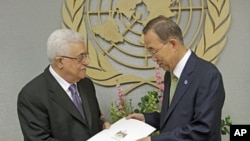Palestinian President Mahmoud Abbas formally asked the U.N. Security Council Friday to recognize a Palestinian state. Israeli Prime Minister Benjamin Netanyahu countered that statehood should only follow a negotiated peace accord, and the international Quartet on the Middle East called for new direct talks under a strict time-frame.
|
Palestinian Statehood Bid Breakdown
|
The long-awaited and controversial move by the Palestinians culminated in a 10-minute meeting at the United Nations, at which Abbas formally submitted the written statehood application to U.N. Secretary General Ban ki-moon.
A half-hour later the Palestinian Authority chief, addressing the U.N. General Assembly and greeted by loud ovations, appealed for international support for what he termed Palestine’s “appointment with history."
Through an interpreter he said, “I say the time has come for my courageous and proud people, after decades of colonial occupation and ceaseless suffering, to live like other peoples of the earth - free, in a sovereign and independent homeland.”
Abbas said no one “with a shred of conscience” could reject the Palestinian application for full U.N. membership.
While denouncing Israeli policies, including erection of what he termed a “racist annexation wall” around West Bank, he said the Palestinians are ready to immediately return to peace talks with Israel - on the basis of a complete settlement freeze.
Abbas said, through an interpreter, “Our efforts are not aimed at isolating Israel or de-legitimizing. Rather, we want to gain legitimacy for the people of Palestine. We only aim to de-legitimize the settlement activity, the occupation and apartheid, and the logic of ruthless force. And we believe that all the countries of the world stand with us in this regard.”
The Palestinian action came despite U.S. and European warnings that statehood - over Israel’s objections and outside of peace talks - would inflame tensions and set back hopes for an Israeli-Palestinian peace accord.
In his U.N. address, shortly after the Abbas speech, the Israeli prime minister said Israel will support Palestinian statehood, but only after a negotiated peace accord that guarantees Israel’s security.
He said Israel left Gaza, uprooting settlements in 2005 to international applause, but was rewarded with a takeover of Gaza, and rocket attacks, by the militant Hamas.
“Israel is prepared to have a Palestinian state in the West Bank, but we’re not prepared to have another Gaza there. And that’s why we need to have real security arrangements, which the Palestinians simply refuse to negotiate with us,” said Netanyahu.
He said the core issue of the conflict is not settlements, but the Palestinians’ refusal to accept a Jewish state in any borders.
Netanyahu renewed a challenge to Abbas to reopen negotiations without preconditions this week, while they are both in New York.
"Who’s there to stop us? What is there to stop us? If we genuinely want peace, what is there to stop us from meeting today and beginning peace negotiations?” asked Netanyahu.
The Security Council may take weeks, or even months, to act on the statehood application.
In the meantime, the United States and the other members of the Middle East Quartet - the European Union, Russia and the United Nations - offered a new proposal for direct talks Friday.
They called for the two parties to come up with comprehensive proposals on territory and security within three months, and to reach a final deal no later than the end of 2012. The Quartet will hold a conference in Moscow to press a deal, and there would be a separate donor conference to boost Palestinian state-building efforts.




